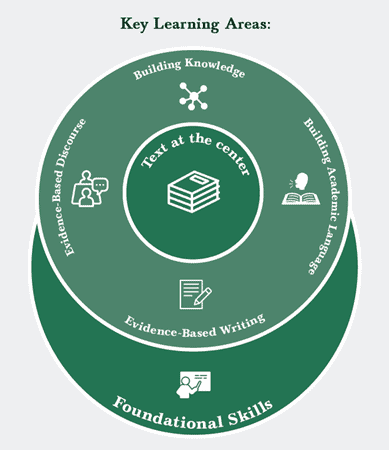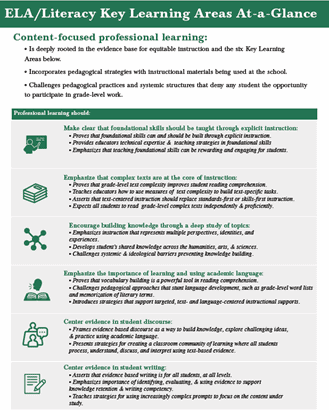The previous post in this series described how the Professional Learning (PL) Core Content is derived from the Principles for High-Quality, Standards-Aligned Professional Learning. This post will explore the ELA/Literacy Key Learning Areas. The next in the series will explore the Key Learning Areas for math professional learning.
So you want to engage in content-focused professional learning…but what content? 
Let’s start with the belief that every student can engage in rigorous, grade-level work that values their identities, perspectives, and voices. Ensuring every student is supported to engage with such work is the foundation of equitable instruction.
If we start with this premise, ELA/literacy professional learning becomes a way to develop deep content knowledge and pedagogical expertise so that teachers can constantly work towards equitable instruction for every student. The PL Core Content Key Learning Areas in ELA/Literacy are the focus for this knowledge and expertise. The six Key Learning Areas are represented in the graphic to the right.
Together, these areas represent essential ELA/literacy content and the interdependent nature of literacy development: complex text at the center of instruction is crucial to the literacy development of student; foundational skills are the early basis of all literacy work; and building knowledge, building academic language, evidence-based writing, and evidence-based discourse operate together in various ways to engage students in deep understanding and analysis of texts.
You know what content focus should be at the heart of ELA/literacy professional learning…now what?
Use the Key Learning Areas to support the development of high-quality, content-focused professional learning. Content-focused professional learning in ELA/literacy should always align to these Key Learning Areas. However, this professional learning cannot be a one-size-fits-all design. The format, pace, sequence, and scope must meet the needs of each setting. Design your professional learning to ensure content, students, teachers, and instruction remain at the center of your work. Check out how some educators designing professional learning have engaged with the PL Core Content:
You are ready to start designing – what resources can you explore to get going?
Explore the Key Learning Areas:
- Watch this video that introduces the PL Core Content for ELA/Literacy.
- Check out the Prezi below to explore the structure of the ELA/Literacy Key Learning Areas and navigate to your particular areas of interest.
Review the broadsheet pictured below and linked here. It frames professional learning for equitable ELA/literacy instruction and provides quick details on the Key Learning Areas.
 |
 |
- Read more about the PL Core Content Key Learning Areas for ELA/Literacy in the full resource here.


















